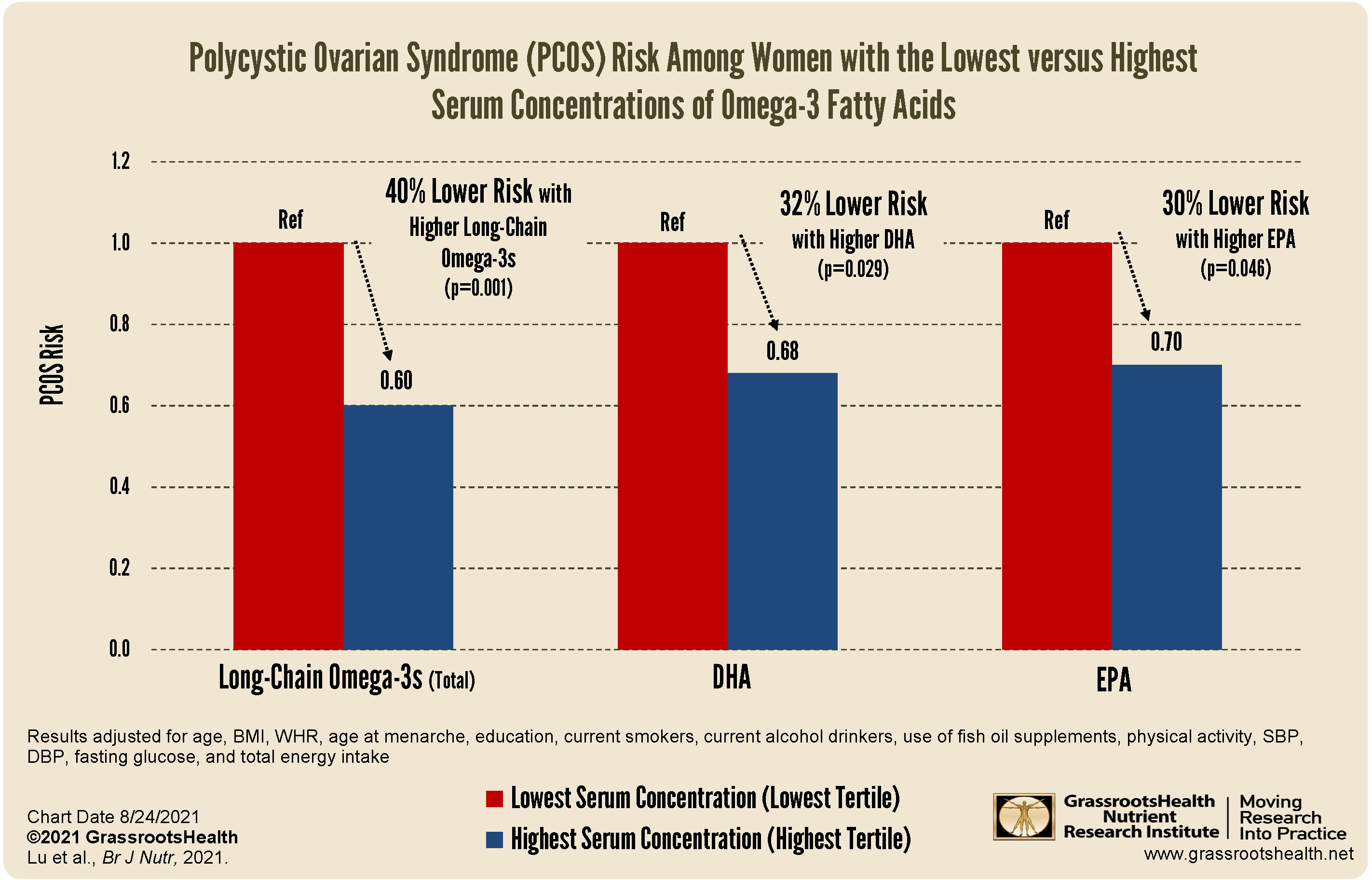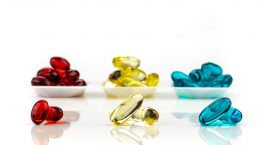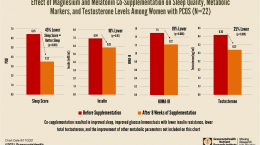Published on August 25, 2021
Study shows inverse association between omega-3 fatty acid intake, serum levels, and polycystic ovary syndrome (PCOS) risk
 Polycystic ovary syndrome (PCOS) is an endocrine disorder that can cause problems with the menstrual cycle and is thought to be directly related to insulin sensitivity. It affects approximately 5-10% of women world-wide, with about 83% of these women also suffering from low fertility or infertility. PCOS causes symptoms that include the accumulation of small cysts on the ovaries, menstrual irregularities, anovulation or irregular ovulation, and other symptoms such as acne and weight issues.
Polycystic ovary syndrome (PCOS) is an endocrine disorder that can cause problems with the menstrual cycle and is thought to be directly related to insulin sensitivity. It affects approximately 5-10% of women world-wide, with about 83% of these women also suffering from low fertility or infertility. PCOS causes symptoms that include the accumulation of small cysts on the ovaries, menstrual irregularities, anovulation or irregular ovulation, and other symptoms such as acne and weight issues.
Certain factors are thought to contribute to the incidence of PCOS, such as genetics, environmental, and dietary factors. Several studies have shown possible benefits of omega-3 fatty acids on PCOS, with enhancement of endothelial function, improved glycemic balance and hormonal balance, and anti-inflammatory effects.
Could Higher Omega-3 Fatty Acid Intake Reduce PCOS?
A recent study by Lu et al. explored the relationship between omega-3 fatty acid intake, resulting serum levels, and PCOS risk. They enrolled 325 women who had been diagnosed with PCOS and 325 matching controls (women of similar age without PCOS) to evaluate and compare their dietary habits and concentrations of omega-3 fatty acids in the diet and blood. Both groups had similar BMI, age at menarche, fasting glucose, insulin, total energy intake, and smoking and alcohol status.
The authors found that the dietary intake of long-chain omega-3 fatty acids was significantly lower among the women with PCOS compared to the women without PCOS (p<0.001). Higher dietary intakes of both DHA and EPA were associated with a lower prevalence of PCOS.
When comparing those with the lowest dietary intakes to the highest intakes of omega-3s and adjusting for potential confounders, there was a
- 39% decreased risk of PCOS for women with higher dietary intake of long-chain omega-3s (p=0.001)
- 32% decreased risk of PCOS for women with higher dietary EPA intake (p=0.047)
- 35% decreased risk of PCOS for women with higher dietary DHA intake (p=0.030)
No significant association was found between the intakes of ALA and DPA and risk of PCOS.
When analyzing by serum levels of omega-3 fatty acids, total omega-3 fatty acids and DHA and EPA (individually) were each inversely associated with the prevalence of PCOS. When comparing the highest levels to the lowest levels and adjusting for potential confounders, there was a
- 37% decreased risk of PCOS among women with higher levels of total omega-3 fatty acids (p=0.003)
- 40% decreased risk of PCOS among women with higher levels of long-chain omega-3 fatty acids (p=0.001)
- 30% decreased risk of PCOS among women with higher levels of EPA (p=0.046)
- 32% decreased risk of PCOS among women with higher levels of DHA (p=0.029)
After adjusting for potential confounders, the inverse relationship between DPA and risk of PCOS became significant as well.
DHA and EPA Have Multiple Health Benefits
Healthy levels of DHA and EPA, which can be measured with an Omega-3 Index of at least 8%, have been associated with heart health, a longer life, brain health, breast cancer, reduced inflammation, and even an improved immune response to viral infection. Much of what you hear about the health effects of omega-3 fatty acids is as a whole combination of omega-3s versus the individual omega-3 fatty acids, however, each individual form may offer its own health effects. Some of the differences between EPA and DHA are reviewed here.
How Much Omega-3s Do You Need?
Whether deciding to get more EPA or DHA for a particular health benefit or overall health, it is important to make sure the combined intake is helping to achieve and maintain an Omega-3 Index of at least 8%. An analysis of GrassrootsHealth data found that approximately 1,300 mg/day of EPA+DHA was needed for 50% of the population and 1,900 mg/day was needed for 90% of the population to achieve and Omega-3 Index of 8%. It is important to point out that, similar to the large variability seen with vitamin D dose response to intake, these intake amounts are averages and there is a large amount of variability in the omega-3 status for different people with the same intake amount. For example, our initial analysis showed that the range of response with 1000 mg of EPA+DHA per day was 5.7% to 10.2%. Therefore, we recommend that individuals measure their Omega-3 Index and determine a personalized dose.
Once results are received, consider your next steps for adjusting the Omega-3 Index, such as how to choose between the different types of omega-3 sources, how to evaluate and choose an omega-3 supplement, and how to achieve a desired Omega-3 Index using an estimated dose of EPA and DHA as determined by our Omega-3 calculator. Taking simple dietary steps to increase consumption of foods rich in EPA and DHA can also help increase your Omega-3 Index.
Testing is Important with Omega-3s as well as Vitamin D
To be sure you are achieving your target Omega-3 Index, and your target vitamin D level (and not a level that is too low or too high for your health concerns), it is vital to measure!
 Having and maintaining healthy vitamin D levels and other nutrient levels can help improve your health now and for your future. Choose which to measure, such as your vitamin D, omega-3s, and essential minerals including magnesium, selenium and zinc, by creating your custom home test kit today. Take steps to improve the status of each of these measurements to benefit your overall health. You can also track your own intakes, symptoms and results to see what works best for YOU.
Having and maintaining healthy vitamin D levels and other nutrient levels can help improve your health now and for your future. Choose which to measure, such as your vitamin D, omega-3s, and essential minerals including magnesium, selenium and zinc, by creating your custom home test kit today. Take steps to improve the status of each of these measurements to benefit your overall health. You can also track your own intakes, symptoms and results to see what works best for YOU.
Enroll and test your levels today, learn what steps to take to improve your status of vitamin D (see below) and other nutrients and blood markers, and take action! By enrolling in the GrassrootsHealth projects, you are not only contributing valuable information to everyone, you are also gaining knowledge about how you could improve your own health through measuring and tracking your nutrient status, and educating yourself on how to improve it.
Help everyone Move Research into Practice with vitamin D and other nutrients! As a special birthday gift to everyone, in honor of the science, we have created a special scholarship fund for anyone to donate to that will go towards helping others participate. Your donation will allow anyone to get help with funding their participation when they need it.
Text-to-give: Text Daction to 44321 to add to our Scholarship Fund.






